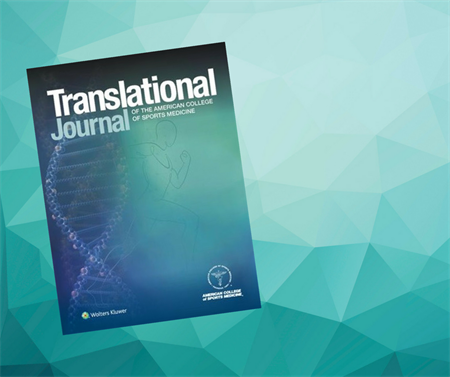ACSM Journals |
Sept.
8, 2020
 The Translational Journal of the American College of Sports Medicine (TJACSM) has undergone several recent changes building on the existing strong foundation in place at TJACSM. Led by Editor-in-Chief John Bartholomew, Ph.D., FACSM, the changes reflect a vision toward further supporting ACSM’s members.
The Translational Journal of the American College of Sports Medicine (TJACSM) has undergone several recent changes building on the existing strong foundation in place at TJACSM. Led by Editor-in-Chief John Bartholomew, Ph.D., FACSM, the changes reflect a vision toward further supporting ACSM’s members.
Structural changes
TJACSM is moving from a single article published every two weeks to a continuous publication model with quarterly compendiums. What does this mean? By including a larger number of articles, the representation of ACSM’s membership can be increased in each issue while also reducing the time to publish, as accepted articles will be made available online prior to appearing in the quarterly collection.
Focus/scope changes
TJACSM is dedicated to broad support for translational research on physical activity and human movement from conception and early testing, through efficacy and effectiveness trials, implementation studies, scoping reviews and policy pieces. To support this aim, the journal will be publishing:
Pilot and feasibility studies
Feasibility and pilot studies are critical components in translational research and to the design of future randomized control trials (RCTs). These RCTs are often revised and repeated before being disseminated and driving change in public policy. The Editorial Board of the TJACSM supports all aspects of this process—and will publish protocol papers, feasibility and pilot studies, RCTs, implementation and dissemination research, scoping reviews and policy papers.
Protocol papers
The transparency of methods would be significantly enhanced through the publication of protocol papers. It is, in fact, the position of the editors of the TJACSM that publication of study protocols and honest reporting of deviations from study protocol are critical to advance the field of translational science and improve the reproducibility of the outcomes.
High-quality trials that report null finding
Although a null finding is often acutely disappointing for translational studies that aim to test the application of efficacious basic or clinical research into the clinical practice or community settings, the lack of a new finding is an important part of the often painstaking iterative process of scientific discovery. Developing and testing a hypothesis against the null hypothesis, which proposes no effect or relationship, is the foundation of the scientific method. Well-designed and conducted studies that demonstrate null results despite sufficient statistical power, i.e., those that fail to reject the null hypothesis, are part of the research process and are fundamental to informing the next research question to be tested.
TJACSM also aims to drive public practice and the research agenda through timely commentaries.
More of what members need
Building on TJACSM’s foundation, emphasis will continue in all areas of the scope and mission of the journal. Two areas to note include:
- TJACSM worked with the Strategic Health Initiative on Women, Sport and Physical Activity to develop themed content in 2019 aimed at further highlighting translational research focused on the sport and physical activity-related needs of women and are pleased to share that this collaboration will continue and the collection will be expanded.
- TJACSM will continue as an e-only journal to develop robust digital assets, such as infographics, that will bring added value to the articles published for all who read the journal.
As a member of the ACSM community, we want to hear from you!
- Let us know what you think about the new changes to the journal
- We invite you to send us your research to share.
- Reach out if you are interested in reviewing for TJACSM. This is not only a great service to the journal but to the broader ACSM.